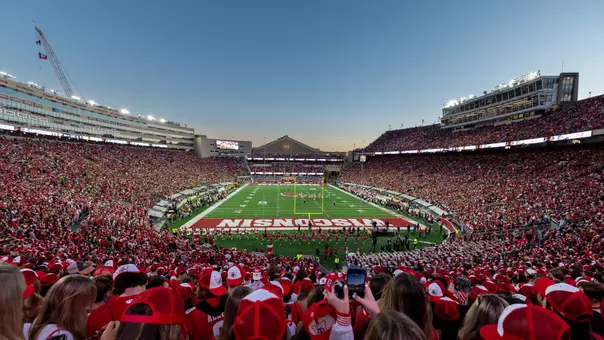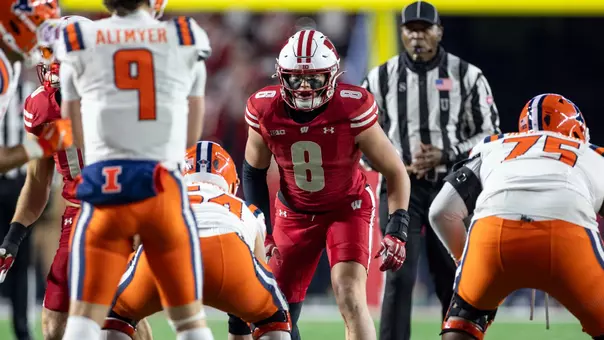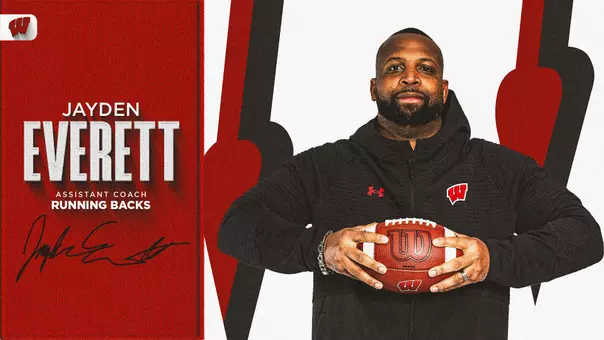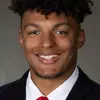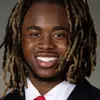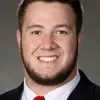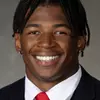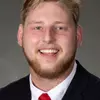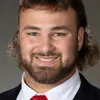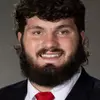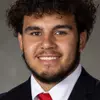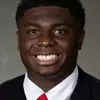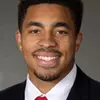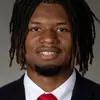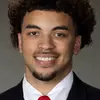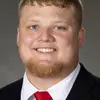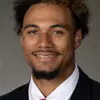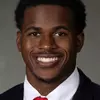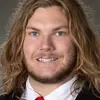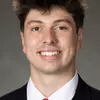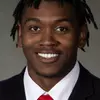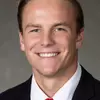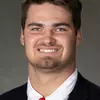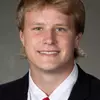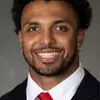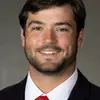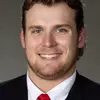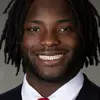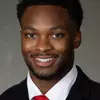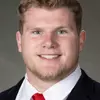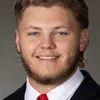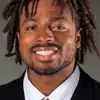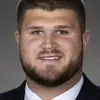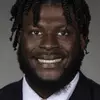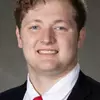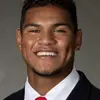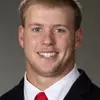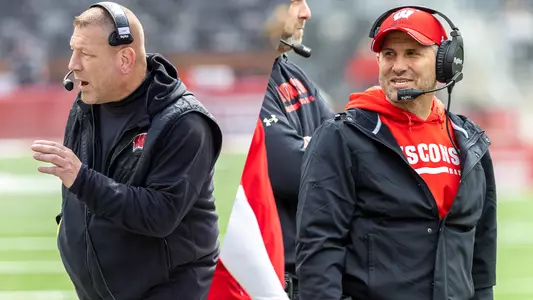
Lucas: What did Badger coaches see in spring ball?
May 10, 2023 | Football
Longo, Tressel share their thoughts on UW’s progress
BY MIKE LUCAS
UWBadgers.com Senior Writer
MADISON, Wis. – Defensive coordinator Mike Tressel was still trying to catch his breath. As a former college wrestler, mind you, he stays in good shape. But the 49-year-old Tressel had just taxed himself physically by running the steps in the lower bowl of Camp Randall Stadium.
He didn't have a choice. Not running wasn't an option.
In what was the 15th and final practice of spring ball, the Badgers concluded the session with a kicking scrimmage featuring punting, kickoffs and field goals. To make things more competitive, a reoccurring theme in all facets of the program, the players were drafted on to Red and White teams.
"Every play is a special team's play, every play is a fourth down, it's really competitive," Tressel said. "There's a lot of pride being on the starting punt team or being on the starting kickoff team. This was an opportunity for those guys to prove that. But it always comes down to field goals in the end."
As it turned out, Tressel's team came up on the short end and had to pay the price. "Coach Fick told everyone beforehand that the consequence was that the losing team would have to run the entire stadium," he said of Wisconsin head coach Luke Fickell's ground rules for the scrimmage's outcome.
"When we gathered at the end, he asked the losing players, 'Did you bring your tennis shoes?'
"They all got wide-eyed before he said, 'Doesn't matter. You're not running. Your coaches are.'"
Off they went – the assistants on the losing side – to the hoots and hollers of the players. After scaling the East stands, crossing over in the South end zone and scaling the West stands, Tressel sighed afterwards, "We had to run the steps if we lost the special teams scrimmage at Cincinnati too."
Nippert Stadium, which opened in 1915 (two years prior to Camp Randall), seats 40,000.
"It's a little bit tougher here," Tressel said of the 75,000-seat venue. "It's just bigger."
Bigger with more rows (65 to 35) and more steps – the biggest of which for this new coaching staff, to date, was completing those 15 practices, their first on-the-field order of business. Between now and the Sept. 2 home opener against Buffalo, there will be another major developmental stage. Summer ball.
"I believe that summer is one of those times where you can really gain ground and pass other programs, other teams, other players," Tressel said of the off-season maturation process revolving around conditioning and summer workouts that follow a short rest and recovery period in May.
"Everybody has summer (session) but it's how you use it."
Offensive coordinator Phil Longo was of the same mindset, "The plan in the summer is a good one. In the August camp, I'd expect us to look the most instinctive that we have looked because of all the work we've done in the summertime.
"As much as it sounds like rhetoric, I really believe this – games are won in the off-season. We got a lot accomplished this spring ball and we're now going to evaluate it. But we have a pretty good idea of what we need to improve on."
From here, the process will segue into a different mode or stage for growth. "It's what our guys do in the summer between their training and the work that they do on their own," Longo said, "that will be the biggest difference between how we looked in the spring and how we operate in August."
One of the April highlights was a de facto spring game, i.e. 'The Launch,' the first open-to-the-public practice, an unveiling that drew 10,000 and served as a snippet of things to come in '23.
On what the 49-year-old Fickell specifically learned about his players and their on-going transition, he said, "They've kind of handled every single thing that has been thrown at them. They have a unique ability to stay together. The locker room – the culture of what has been here – is really strong …
"There are going to be lulls that they hit. But when you've challenged them, they've continued to push. What a great attitude. Change is not always the easiest thing, whether it's a change in the way you play defense, a change in the way you play offense, a change in leadership."
Tressel was on the same wavelength with Fickell. "I love the ability they have to adjust and self-correct," he said of the players in the defensive meeting room. "That tells you how much ball they know. The culture of effort and attitude and strain really grew. The guys always knew they worked hard.
"But a lot of them said to me at the end (of spring), 'Boy, I really recognize the difference now.'"
He loved hearing that. Why wouldn't he? "They know ball and they've been coached well, so that's really good," Tressel reiterated. "We've tried to take as much as they've already done and done really well … because if guys believe in something and it applies, we want to hold on to that.
"Now, there are going to be things that don't apply … but I was really happy with the way they adapted. They want to know the 'Why' because they're smart. But there was never any question of anything we did."
While accenting conventional spring revelations – "We did get a lot of questions answered in terms of what kids can handle and what we really feel guys' strengths are right now" – Tressel cautioned against making too many judgements. In this context, how much of his defense was introduced?
"I'm going to throw out a number … 85 percent of the system," said Tressel, who predominantly favored 3-3-5 personnel at Cincinnati (at least 66% of the time). "There are some things that you don't want to work on until you're getting ready to game plan. But we did get a great majority of it in."
As far as installing his version of the Air Raid attack, Longo said, "It's all in" adding "We just have those little wrinkles to work on situationally." Such as, "What you do in the lower red zone or what you do on third-and-12-plus. You're going to take from what exists in the offense and make adjustments."
Longo, like Tressel, got some questions answered. "I did from a 'What do we have?' (personnel standpoint). I did from a 'Can these guys handle tempo?'" he said "They did much better than anyone gave them credit for. To go from what they did to what we're doing now … it was a learning curve."
How did two of the highest profile returning offensive pieces – tailbacks Braelon Allen and Chez Mellusi – handle the changes? "I thought it was very interesting," Longo replied. "Neither of them said 'Air Raid' and got concerned. They both went and watched film. They both read up on it.
"They both listened to the things that we talked about when installing it and they very quickly understood that the run game is as important as throwing the football. We don't want to be one-dimensional. I've said it a thousand times, I don't care if we run it 70 times or throw it 70 times.
"Our motto is 'Take what they give us' and we kind of exercise that on every down."
No surprise in the approach. But what about the surprises this spring? "Depth on the O-line," Longo said. "Sounds kind of funny because you'd think it exists here. But you don't have the kind of depth that we have at a lot of places."
The Badgers lost two major contributors on the O-line: guard-tackle Tyler Beach, their most experienced lineman (58 games, 30 starts); and center Joe Tippmann, the first UW player taken in last week's NFL draft. The New York Jets selected Tippmann in the second round (43rd pick overall).
Cincinnati transfer Jake Renfro was targeted to replace Tippmann. But he was injured early in the spring forcing Tanor Bortolini to slide over from guard. At 'The Launch,' the starters were Bortolini; Jack Nelson and Riley Mahlman at tackle; Joe Huber, another Cincy transfer, and Michael Furtney at guard.
The 2's were Nolan Rucci, Joe Brunner, Dylan Barrett, JP Benzschawel and Trey Wedig.
"The other surprise," Longo went on, "is there's more existing talent here at wide receiver than anyone gave them credit for."
Besides noting the return of Chimere Dike, Skyler Bell, and Keontez Lewis, the top three receivers last year, Longo mentioned a trio of redshirt freshmen – Vinny Anthony, Tommy McIntosh, Chris Brooks – in a room bolstered by transfers Will Pauling, Quincy Burroughs, C.J. Williams and Bryson Green.
"We added four (transfers), which we needed to add because they were only carrying seven to eight scholarship receivers and you want 11 or 12," Longo said, doing the Air Raid math. "It becomes a war of attrition with all these routes that we run. You've got to run them in practice every day.
"When you're doing it with seven or eight people, you're wearing people out. To have 11 or 12 gives you a chance to keep receivers fresh. And now you're training the next tier of guys, the next era of receivers, the younger guys, so when they get an opportunity, it's old news for them. They know it well."
Longo got to know his quarterbacks well, starting with the new Badger starter, Tanner Mordecai.
"He really had a great spring," he said of the SMU transfer. "I look at progress. I look at where we are mentally. I look at how instinctive our throws are becoming. You can watch the only public practice (The Launch) and make some one-day judgements.
"If that was indicative of how he has been playing all spring, I would be concerned. But it's not. It's the outlier. I look at the body of work. I have all the confidence in the world in Tanner Mordecai. And I've been really happy with the rest of the room in terms of learning the offense.
"They're all on different levels of progress."
Pushing Mordecai, a sixth-year senior, throughout spring ball was Braedyn Locke, a redshirt freshman transfer from Mississippi State. "I was really appreciative of and respected his maturity," Longo said. "He has a nose-to-the-grindstone attitude and finished strong."
Longo also touched on the learning curves for Nick Evers, a redshirt freshman transfer from Oklahoma; Myles Burkett, a redshirt freshman holdover; and Cole LaCrue, a true frosh. "For some of the younger guys," he said, "who were different in offenses last year, it was a greater mountain to climb."
As opposed to Mordecai, a two-year starter in a comparable spread attack. Longo confided that he was "really interested to see how Tanner would respond" to an interception-marred showing at The Launch. Said Longo, "His demeanor never changed. The focus never changed. The poise was there.
"It was kind of a good exercise for him to go through and maybe just for me to see."
The reaction or Mordecai's response to any adversity being more telling than the action. "That's what spring football is about," Longo said. "That's why Luke keeps trying to put them in scenarios where they're going to be uncomfortable because you want to see how they're going to respond."
Mordecai has been one of the emerging leaders on offense, Longo confirmed. "Then there's our other Tanor – Tanor Bortolini who has done a good job, he's another leader we've been very happy with," he said. "And Chim Dike would probably be the top skill guy from a leadership standpoint."
Longo shared his personal take on the leadership topic, "The expectation is that you have this tremendous number of leaders on a team. You don't. The truth is – the reality is – there are four or five that surface on a roster of 120 every year. If people have more, I would not call that the norm."
Tressel tackled the same question on his side of the ball. "It means more once you get to the games," he said of players validating themselves as leaders. "But I thought (safety) Hunter Wohler's style of leadership really caught on. You could see it in his eyes. Other people could see it in his eyes.
"His leadership really grew in the way that people received it."
Tressel also singled out the inside linebackers, Maema Njongmeta and Jordan Turner. In 2022, they were first-year starters and ended up as the top two tacklers on the defense. Both are redshirt juniors. Both bring stability to the unit as a whole. "I thought they took big steps," Tressel said.
So did redshirt sophomore cornerback Ricardo Hallman, according to Tressel. "I thought he took huge steps in confidence, strain, consistency of effort, technique and it resulted in him making a lot of plays," he praised. "At the end of practice 15, that would be one guy that really jumped out at me."
Alexander Smith, a sixth-year senior, held down the corner opposite Hallman. Behind them were two early enrollees, true freshmen corners, Jonas Duclona and Jace Arnold. "You call them freshman corners, I still call them high school seniors," Tressel said. "They didn't know what they didn't know.
"At the beginning of the spring, they had no idea what they were getting themselves into.
"By the end of the spring, they certainly looked like they belonged. So that's exciting."
On whether the defense exceeded his expectations for the spring ball product, Tressel said, "That's honestly a hard one to answer because I had such a high image of Wisconsin football and Wisconsin defense. That's part of the reason Coach Fick took this job and I was excited to be a part of it.
"I know what type of ball the Badgers play and what type of defense we've always played here.
"It's great to see that first-hand. Quite honestly, I've seen it before. So I expected it."
Tressel tends to be excitable. It's his nature, his business card, if you will. He loves the game. "Heck yeah, I'm energized about this situation," he stressed. "I thought early in the spring there were a couple of things that took our confidence away – if there was a bad play here or a bad play there.
"As the spring went on, we were able to maintain the confidence and belief and nothing really phased us. That was really good to see. Even today (in practice No. 15), the guys challenged themselves and we challenged them, and they came back and played really good ball. I loved seeing that."
So did Fickell. Going into the off-season, he recognizes that there are some areas of need that must be addressed, whether it's the punting game or depth at defensive back. "We have some young guys who are going to have to grow up really fast to be a part of it (the secondary)," Fickell said.
There are some unknowns, too, – players who were limited this spring due to injuries. Reflecting on the 15 practices, Fickell admitted, "It's kind of bittersweet. It's nice to wrap-up. But this is what you're going to miss, too. It's a unique time. Especially in your first year. We're all kind of learning each other."
To be continued.
UWBadgers.com Senior Writer
MADISON, Wis. – Defensive coordinator Mike Tressel was still trying to catch his breath. As a former college wrestler, mind you, he stays in good shape. But the 49-year-old Tressel had just taxed himself physically by running the steps in the lower bowl of Camp Randall Stadium.
He didn't have a choice. Not running wasn't an option.
In what was the 15th and final practice of spring ball, the Badgers concluded the session with a kicking scrimmage featuring punting, kickoffs and field goals. To make things more competitive, a reoccurring theme in all facets of the program, the players were drafted on to Red and White teams.
"Every play is a special team's play, every play is a fourth down, it's really competitive," Tressel said. "There's a lot of pride being on the starting punt team or being on the starting kickoff team. This was an opportunity for those guys to prove that. But it always comes down to field goals in the end."
As it turned out, Tressel's team came up on the short end and had to pay the price. "Coach Fick told everyone beforehand that the consequence was that the losing team would have to run the entire stadium," he said of Wisconsin head coach Luke Fickell's ground rules for the scrimmage's outcome.
"When we gathered at the end, he asked the losing players, 'Did you bring your tennis shoes?'
"They all got wide-eyed before he said, 'Doesn't matter. You're not running. Your coaches are.'"
Off they went – the assistants on the losing side – to the hoots and hollers of the players. After scaling the East stands, crossing over in the South end zone and scaling the West stands, Tressel sighed afterwards, "We had to run the steps if we lost the special teams scrimmage at Cincinnati too."
Nippert Stadium, which opened in 1915 (two years prior to Camp Randall), seats 40,000.
"It's a little bit tougher here," Tressel said of the 75,000-seat venue. "It's just bigger."
Bigger with more rows (65 to 35) and more steps – the biggest of which for this new coaching staff, to date, was completing those 15 practices, their first on-the-field order of business. Between now and the Sept. 2 home opener against Buffalo, there will be another major developmental stage. Summer ball.
"I believe that summer is one of those times where you can really gain ground and pass other programs, other teams, other players," Tressel said of the off-season maturation process revolving around conditioning and summer workouts that follow a short rest and recovery period in May.
"Everybody has summer (session) but it's how you use it."
Offensive coordinator Phil Longo was of the same mindset, "The plan in the summer is a good one. In the August camp, I'd expect us to look the most instinctive that we have looked because of all the work we've done in the summertime.
"As much as it sounds like rhetoric, I really believe this – games are won in the off-season. We got a lot accomplished this spring ball and we're now going to evaluate it. But we have a pretty good idea of what we need to improve on."
From here, the process will segue into a different mode or stage for growth. "It's what our guys do in the summer between their training and the work that they do on their own," Longo said, "that will be the biggest difference between how we looked in the spring and how we operate in August."
One of the April highlights was a de facto spring game, i.e. 'The Launch,' the first open-to-the-public practice, an unveiling that drew 10,000 and served as a snippet of things to come in '23.
On what the 49-year-old Fickell specifically learned about his players and their on-going transition, he said, "They've kind of handled every single thing that has been thrown at them. They have a unique ability to stay together. The locker room – the culture of what has been here – is really strong …
"There are going to be lulls that they hit. But when you've challenged them, they've continued to push. What a great attitude. Change is not always the easiest thing, whether it's a change in the way you play defense, a change in the way you play offense, a change in leadership."
Tressel was on the same wavelength with Fickell. "I love the ability they have to adjust and self-correct," he said of the players in the defensive meeting room. "That tells you how much ball they know. The culture of effort and attitude and strain really grew. The guys always knew they worked hard.
"But a lot of them said to me at the end (of spring), 'Boy, I really recognize the difference now.'"
He loved hearing that. Why wouldn't he? "They know ball and they've been coached well, so that's really good," Tressel reiterated. "We've tried to take as much as they've already done and done really well … because if guys believe in something and it applies, we want to hold on to that.
"Now, there are going to be things that don't apply … but I was really happy with the way they adapted. They want to know the 'Why' because they're smart. But there was never any question of anything we did."
While accenting conventional spring revelations – "We did get a lot of questions answered in terms of what kids can handle and what we really feel guys' strengths are right now" – Tressel cautioned against making too many judgements. In this context, how much of his defense was introduced?
"I'm going to throw out a number … 85 percent of the system," said Tressel, who predominantly favored 3-3-5 personnel at Cincinnati (at least 66% of the time). "There are some things that you don't want to work on until you're getting ready to game plan. But we did get a great majority of it in."
As far as installing his version of the Air Raid attack, Longo said, "It's all in" adding "We just have those little wrinkles to work on situationally." Such as, "What you do in the lower red zone or what you do on third-and-12-plus. You're going to take from what exists in the offense and make adjustments."
Longo, like Tressel, got some questions answered. "I did from a 'What do we have?' (personnel standpoint). I did from a 'Can these guys handle tempo?'" he said "They did much better than anyone gave them credit for. To go from what they did to what we're doing now … it was a learning curve."
How did two of the highest profile returning offensive pieces – tailbacks Braelon Allen and Chez Mellusi – handle the changes? "I thought it was very interesting," Longo replied. "Neither of them said 'Air Raid' and got concerned. They both went and watched film. They both read up on it.
"They both listened to the things that we talked about when installing it and they very quickly understood that the run game is as important as throwing the football. We don't want to be one-dimensional. I've said it a thousand times, I don't care if we run it 70 times or throw it 70 times.
"Our motto is 'Take what they give us' and we kind of exercise that on every down."
No surprise in the approach. But what about the surprises this spring? "Depth on the O-line," Longo said. "Sounds kind of funny because you'd think it exists here. But you don't have the kind of depth that we have at a lot of places."
The Badgers lost two major contributors on the O-line: guard-tackle Tyler Beach, their most experienced lineman (58 games, 30 starts); and center Joe Tippmann, the first UW player taken in last week's NFL draft. The New York Jets selected Tippmann in the second round (43rd pick overall).
Cincinnati transfer Jake Renfro was targeted to replace Tippmann. But he was injured early in the spring forcing Tanor Bortolini to slide over from guard. At 'The Launch,' the starters were Bortolini; Jack Nelson and Riley Mahlman at tackle; Joe Huber, another Cincy transfer, and Michael Furtney at guard.
The 2's were Nolan Rucci, Joe Brunner, Dylan Barrett, JP Benzschawel and Trey Wedig.
"The other surprise," Longo went on, "is there's more existing talent here at wide receiver than anyone gave them credit for."
Besides noting the return of Chimere Dike, Skyler Bell, and Keontez Lewis, the top three receivers last year, Longo mentioned a trio of redshirt freshmen – Vinny Anthony, Tommy McIntosh, Chris Brooks – in a room bolstered by transfers Will Pauling, Quincy Burroughs, C.J. Williams and Bryson Green.
"We added four (transfers), which we needed to add because they were only carrying seven to eight scholarship receivers and you want 11 or 12," Longo said, doing the Air Raid math. "It becomes a war of attrition with all these routes that we run. You've got to run them in practice every day.
"When you're doing it with seven or eight people, you're wearing people out. To have 11 or 12 gives you a chance to keep receivers fresh. And now you're training the next tier of guys, the next era of receivers, the younger guys, so when they get an opportunity, it's old news for them. They know it well."
Longo got to know his quarterbacks well, starting with the new Badger starter, Tanner Mordecai.
"He really had a great spring," he said of the SMU transfer. "I look at progress. I look at where we are mentally. I look at how instinctive our throws are becoming. You can watch the only public practice (The Launch) and make some one-day judgements.
"If that was indicative of how he has been playing all spring, I would be concerned. But it's not. It's the outlier. I look at the body of work. I have all the confidence in the world in Tanner Mordecai. And I've been really happy with the rest of the room in terms of learning the offense.
"They're all on different levels of progress."
Pushing Mordecai, a sixth-year senior, throughout spring ball was Braedyn Locke, a redshirt freshman transfer from Mississippi State. "I was really appreciative of and respected his maturity," Longo said. "He has a nose-to-the-grindstone attitude and finished strong."
Longo also touched on the learning curves for Nick Evers, a redshirt freshman transfer from Oklahoma; Myles Burkett, a redshirt freshman holdover; and Cole LaCrue, a true frosh. "For some of the younger guys," he said, "who were different in offenses last year, it was a greater mountain to climb."
As opposed to Mordecai, a two-year starter in a comparable spread attack. Longo confided that he was "really interested to see how Tanner would respond" to an interception-marred showing at The Launch. Said Longo, "His demeanor never changed. The focus never changed. The poise was there.
"It was kind of a good exercise for him to go through and maybe just for me to see."
The reaction or Mordecai's response to any adversity being more telling than the action. "That's what spring football is about," Longo said. "That's why Luke keeps trying to put them in scenarios where they're going to be uncomfortable because you want to see how they're going to respond."
Mordecai has been one of the emerging leaders on offense, Longo confirmed. "Then there's our other Tanor – Tanor Bortolini who has done a good job, he's another leader we've been very happy with," he said. "And Chim Dike would probably be the top skill guy from a leadership standpoint."
Longo shared his personal take on the leadership topic, "The expectation is that you have this tremendous number of leaders on a team. You don't. The truth is – the reality is – there are four or five that surface on a roster of 120 every year. If people have more, I would not call that the norm."
Tressel tackled the same question on his side of the ball. "It means more once you get to the games," he said of players validating themselves as leaders. "But I thought (safety) Hunter Wohler's style of leadership really caught on. You could see it in his eyes. Other people could see it in his eyes.
"His leadership really grew in the way that people received it."
Tressel also singled out the inside linebackers, Maema Njongmeta and Jordan Turner. In 2022, they were first-year starters and ended up as the top two tacklers on the defense. Both are redshirt juniors. Both bring stability to the unit as a whole. "I thought they took big steps," Tressel said.
So did redshirt sophomore cornerback Ricardo Hallman, according to Tressel. "I thought he took huge steps in confidence, strain, consistency of effort, technique and it resulted in him making a lot of plays," he praised. "At the end of practice 15, that would be one guy that really jumped out at me."
Alexander Smith, a sixth-year senior, held down the corner opposite Hallman. Behind them were two early enrollees, true freshmen corners, Jonas Duclona and Jace Arnold. "You call them freshman corners, I still call them high school seniors," Tressel said. "They didn't know what they didn't know.
"At the beginning of the spring, they had no idea what they were getting themselves into.
"By the end of the spring, they certainly looked like they belonged. So that's exciting."
On whether the defense exceeded his expectations for the spring ball product, Tressel said, "That's honestly a hard one to answer because I had such a high image of Wisconsin football and Wisconsin defense. That's part of the reason Coach Fick took this job and I was excited to be a part of it.
"I know what type of ball the Badgers play and what type of defense we've always played here.
"It's great to see that first-hand. Quite honestly, I've seen it before. So I expected it."
Tressel tends to be excitable. It's his nature, his business card, if you will. He loves the game. "Heck yeah, I'm energized about this situation," he stressed. "I thought early in the spring there were a couple of things that took our confidence away – if there was a bad play here or a bad play there.
"As the spring went on, we were able to maintain the confidence and belief and nothing really phased us. That was really good to see. Even today (in practice No. 15), the guys challenged themselves and we challenged them, and they came back and played really good ball. I loved seeing that."
So did Fickell. Going into the off-season, he recognizes that there are some areas of need that must be addressed, whether it's the punting game or depth at defensive back. "We have some young guys who are going to have to grow up really fast to be a part of it (the secondary)," Fickell said.
There are some unknowns, too, – players who were limited this spring due to injuries. Reflecting on the 15 practices, Fickell admitted, "It's kind of bittersweet. It's nice to wrap-up. But this is what you're going to miss, too. It's a unique time. Especially in your first year. We're all kind of learning each other."
To be continued.
Players Mentioned
Wisconsin Football || Building the Badgers || Episode 4
Monday, January 26
Wisconsin Football || Building the Badgers || Episode 3
Thursday, January 22
Luke Fickell Media Conference
Wednesday, January 21
Building the Badgers || Episode 2 || Wisconsin Football
Friday, January 09

